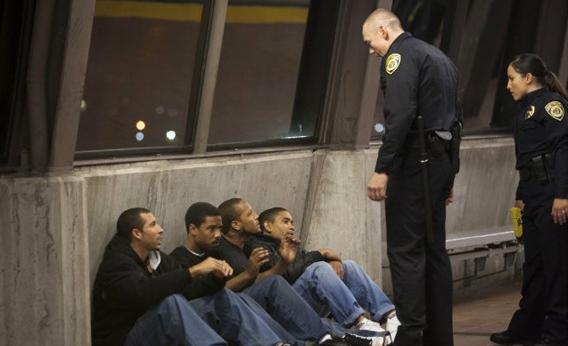Fruitvale Station is the name of an Oakland stop on the Bay Area Rapid Transit system. There, early on the morning of New Year’s Day 2009, a 22-year-old black man named Oscar Grant, on his way home from celebrating New Year’s Eve with friends in San Francisco, was shot in the back by a white BART policeman for reasons that remain unclear. (On trial, the cop claimed he had mistaken his gun for his Taser, resulting in a reduced conviction and sentence).
Fruitvale Station, the quietly assured yet gut-punching debut feature of 27-year-old USC film school graduate and Oakland native Ryan Coogler, opens with a clip of real cellphone footage of the shooting, which was captured by several bystanders. It’s difficult to make out what’s going on in the blurry, chaotic scuffle we witness, but the sound of that shot ringing out at the end makes the outcome sickeningly clear. The inevitability of the shooting—the fact that we know exactly what will happen on that train platform, and when—lends the rest of the film an almost unbearable sense of impending doom, as we move backward in time to experience the last day of Oscar Grant’s life, intercut with occasional flashbacks from his more distant past.
As played with extraordinary compassion and subtlety by Michael B. Jordan—whose face will be familiar to fans of The Wire and Friday Night Lights—Oscar is a young black man of a type we don’t often see on movie screens. He’s nobody’s angel—he’s served stints in prison in the past, his chronic lateness to work has just cost him his job at a grocery store meat counter, and when his girlfriend Sophina (Melonie Diaz) accuses him of messing around with other women, he barely bothers to deny it. But Oscar is also a devoted father to his and Sophina’s 4-year-old daughter, Tatiana (Ariana Neal), and a loving son to his single mother, Wanda (Octavia Spencer). And he’s trying to get his life together and cut out the small-time pot dealing that threatens to land him in jail again.
Much of Oscar’s last day on Earth is spent preparing for his mother’s birthday dinner with his extended family: He buys seafood at the market where he used to work, then picks out a birthday card on behalf of his sister (“Don’t get me no fake-ass card with no white people on it,” she tells him, a request he impishly disobeys). There’s a chance encounter with a stray dog that foreshadows Oscar’s own fate a bit too neatly, and a flirtation with a white woman who will unwittingly play a key role in his final minutes. As cinematographer Rachel Morrison’s camera follows Oscar through an apparently ordinary day whose deep sadness only we are in a position to recognize, the texts he taps out on his phone pop up onscreen for us to read—one of the few stylized touches in this generally low-key, naturalistic drama.
As the harrowing last quarter of the film approaches, nearly every line seems to ironically underscore the randomness of Oscar’s fate. His mother suggests he and his friends take the BART to the city rather than drive, “to stay safe.” Dropping his daughter at her cousins’ house to spend the night, he reassures her that the sounds coming from outside are only firecrackers, not gunshots. When we finally find ourselves back on that Fruitvale station platform, the events we witnessed earlier on that murky cellphone video are replayed in fictional form—without providing much more clarity as to what happened, other than to demonstrate how quickly an incident of racial profiling can escalate into horrific violence. The following scene—in which Oscar’s girlfriend, friends, and family gather at the hospital to wait out the night, unaware (unlike us) that he will have bled to death by morning—is perhaps even harder to watch, as his mother pleads with her son’s furious friends to let go of their anger and come together to “lift Oscar up.” Like Jordan, Octavia Spencer never hits a false note. In what could easily have been an idealized, saintly role, she projects a tart, almost prickly pragmatism, especially in a flashback scene where she visits her son in prison to deliver some seriously tough love.
Under its original title, Fruitvale, this film won both the Grand Jury Prize and the Audience Award for drama at Sundance; as it happens, its national release coincides with George Zimmerman’s trial for the killing of Trayvon Martin. I suppose you might say that this grim coincidence creates an occasion for a discussion of racial inequity in America. But Coogler isn’t out to brandish a manifesto about the use of excessive police force or the limited opportunities for young black men. Fruitvale Station’s wrenching power lies in the specificity of its storytelling and the ordinary human warmth of the world it conjures. You walk out of it, not shaking your head over an abstract social problem, but grieving the senseless death of one flawed, complex, tragically young man.
